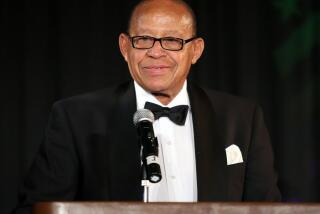Richard Wilson; Director, Writer and Actor
- Share via
Richard Wilson, a director, writer and actor who traced his dramatic roots to Orson Welles’ fabled Mercury Theater and who spent the last years of his life compiling audio anthologies of Welles’ radio broadcasts and resurrecting some long-vanished film clips, has died.
Myron S. Meisel, one of the producers of Wilson’s final project, said Wilson was 75 when he died Wednesday at his home in Santa Monica of pancreatic cancer.
Wilson worked in various capacities on such Welles classics as “Citizen Kane,” “The Magnificent Ambersons” and “Macbeth.” He later established his own credits for his direction of films such as “Al Capone,” “Invitation to a Gunfighter” and “Pay or Die,” a Mafia-centered drama Wilson also wrote. The last picture was said to have influenced the work of Martin Scorsese and Francis Coppola.
Born in McKeesport, Pa., the son of a steel executive, Wilson moved to Denver with his parents and studied drama there, winning honors as an actor and announcer while in high school.
He went to New York in 1936 and a year later joined Welles and John Houseman in the founding of the Mercury Theater, where he was an actor and stage manager for a production of “Julius Caesar,” then an unprecedented, modern-dress, dramatic breakthrough.
While staging plays he also worked on the Mercury Theater of the Air, including such legendary broadcasts as “War of the Worlds” in 1938, which led many in the country to think Martian invaders were at hand.
During World War II, he worked as chief of the operations division of the Office of Strategic Services and was head photographic officer for the United Nations at its opening conference in San Francisco in 1945.
After the war, when Welles went abroad to work, Wilson joined Universal-International, producing “The Golden Blade” and some of the Ma and Pa Kettle films.
His other writing and directing credits include “Man With a Gun,” “A Raw Wind in Eden” and “The Big Boodle,” one of Errol Flynn’s last films.
He also taught directing at USC.
At his death, he was producing a film based on the reconstruction of some long-lost footage Welles made in 1942 in Brazil for a picture that was to have been called “Four Raftsmen.” Meisel said the picture, “It’s All True,” will be released next year.
In 1963, Wilson looked back on his years-long affiliation with Welles, an actor and director acclaimed and chastised for his puzzling genius.
“Orson is the world’s greatest living director,” Wilson said, years before Welles’ death in 1985. “But he doesn’t always make the best pictures.”
Wilson’s survivors include his wife, Betty, a son, four grandchildren and a brother and sister.
A memorial will be held Oct. 12 at 10:30 a.m. at the Directors Guild of America offices.
More to Read
Only good movies
Get the Indie Focus newsletter, Mark Olsen's weekly guide to the world of cinema.
You may occasionally receive promotional content from the Los Angeles Times.










